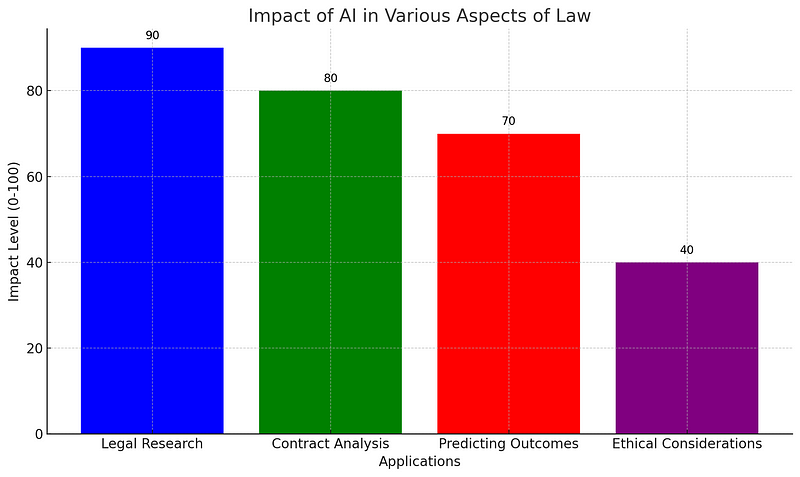Disruptive Innovations: Navigating the Legal Landscape with AI
Written on
Chapter 1: The Intersection of Law and Technology
In today's world, technology influences virtually every aspect of our lives, and the legal sector is no exception. Picture a scenario where artificial intelligence (AI) aids in unraveling legal complexities, making law more comprehensible and accessible. This isn't merely a figment of imagination; it's occurring in real-time.
AI's Role in the Legal Field
The legal domain is notorious for its complexity, filled with extensive case files, legal precedents, and convoluted statutes. This is where AI, particularly Large Language Models (LLMs) like ChatGPT, come into play, significantly transforming this traditional landscape. These AI systems, trained on extensive legal texts, can comprehend and produce human-like language, offering revolutionary support in legal research, contract evaluation, and even forecasting court rulings.
Recent studies have extensively analyzed the influence of AI in law. These investigations not only highlighted advanced applications within the legal realm but also explored AI's potential to reshape the judicial process. The research examined practical uses of legal LLMs, such as assisting judges in trials and providing legal counsel, while also addressing concerns related to data, algorithms, and actual legal practices. The findings underscored the pivotal role AI plays in law, stressing the necessity for future innovations to address identified challenges.
A Valuable Ally in Legal Research
Legal research is one of the most labor-intensive tasks for attorneys. AI emerges as a robust ally, enabling legal professionals to navigate through millions of documents in a fraction of the time required by humans. This capability not only enhances speed but also increases accuracy, revealing connections in case law that may elude human researchers.
Streamlining Contract Review
Contracts form the foundation of the business landscape, yet reviewing them is often laborious and prone to errors. AI revolutionizes this process by swiftly analyzing contracts, identifying potential pitfalls, and even proposing enhancements. This advancement not only conserves time but also diminishes the likelihood of costly oversights.
Anticipating Court Decisions
Imagine the ability to forecast a court's ruling on a case. AI is making strides toward this goal by examining historical court decisions and detecting patterns. Although not infallible, this ability can enable lawyers to strategize more effectively and manage client expectations.
The Human Element in AI-Driven Law
Despite the remarkable advantages AI brings, it cannot replace the necessity for human judgment. Legal determinations often involve ethical considerations, empathy, and a profound understanding of human context—areas where AI still falls short. Thus, the optimal approach merges AI's efficiency with human insight.
Challenges in Merging AI with Legal Practices
Integrating AI into legal practices presents its own set of challenges. A significant concern revolves around data privacy and security, particularly when dealing with sensitive legal information. Additionally, there is the risk of bias; if the data that AI learns from is biased, its outputs will mirror that bias. This issue is especially critical in legal contexts, where fairness and impartiality are essential.

Understanding AI's Influence on Legal Practices
To better grasp the various ways AI is influencing the legal landscape, consider the graph titled “AI's Impact Across Legal Domains.” This visual representation illustrates the level of influence (on a scale from 0 to 100) that AI exerts on various legal tasks such as research, contract assessment, outcome prediction, and the consideration of ethical implications.
The Future of AI in the Legal Sphere
As AI technology continues to advance, its potential within the legal sector expands. Looking ahead, we may witness AI-assisted virtual courtrooms or AI mediators facilitating dispute resolutions. The opportunities are as expansive as the technology itself.
A Transformative Era in Legal History
AI is not merely altering the legal landscape; it is revolutionizing it. By automating routine tasks, providing deep insights, and assisting in outcome prediction, AI allows lawyers to concentrate on the more nuanced aspects of their profession. This synergy between technology and law is not solely about efficiency; it aims to create a more accessible and equitable legal system for all.
In this new chapter, the law is no longer solely the domain of attorneys and judges. It is evolving into a space where technology, with its vast capabilities, collaborates with human expertise to establish a more just and efficient legal framework. For those contemplating the future, this convergence of law and AI presents an exhilarating and promising domain, replete with opportunities to effect genuine change in the world.
About Disruptive Concepts
Welcome to @Disruptive Concepts — your gateway to the future of technology. Subscribe for insightful videos every Saturday!
Watch us on YouTube.